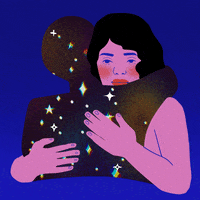How Empathy is Experienced as a Neurodivergent
It is a myth that Neurodivergents, especially those with Autism, lack empathy. Many Neurodivergents experience heightened emotional empathy. This myth may be rooted in the double blind empathy problem
Do Autistic people have empathy?
It is a pervasive and harmful myth that neurodivergent people, especially those with Autism, lack empathy.
I am an AudHD Neurodivergent who has taught Autistic teenagers for 12 years, and I organise two large thriving neurodivergent communities with many Autistic members (both IRL and online). I can assure you that this is not true. This myth may be a result of the double blind empathy problem which I will discuss later.
Many Neurodivergents, including those with Autism, ADHD and AuDHD are extremely empathetic, so much so that it can be a source of immense emotional distress for us.
What is empathy?
Empathy is feeling and understanding the emotions of others. It is imagining what someone else might be going through. It’s being sensitive and caring and wanting to to help and support others. Empathy helps us connect, build relationships, and show compassion towards those in need.
Different types of empathy
Empathy is complex. More complex than most people probably realise. For starters, there are many types of empathy. Each type of empathy corresponds to different neural pathways and experiences for the individual. It is possible to be deficient in one type of empathy and abundant in another type.

Compassionate empathy
Compassionate empathy is feeling compelled to alleviate the suffering of other people or animals.
I am unable to find research that compares prosocial behaviours of neurotypicals vs neurodivergents, so my observations are purely anecdotal.
However, the majority of neurodivergents I know are very compassionate and inclined to help animals or people in need. I know many neurodivergents who generously help in any way that they can, and I know many neurotypicals who don’t.
Somatic empathy
Somatic empathy is feeling the physical sensations of others. For example, if you see someone in pain, you might feel a similar sensation in your own body. Watching a documentary about Arctic explorers might make you feel chilly if you have high levels of somatic empathy.
Cognitive empathy
Cognitive empathy is understanding and processing thoughts and emotions from other peoples POV. If like me, you’re an older neurodivergent who has masked your whole life, you may have created a safe world of familiar people and experiences, and so you might not realise you lack in this area, or you may think you have overcome your lack of cognitive empathy.
However, do unfamiliar situations with unfamiliar people make you feel uncertain and socially anxious? If so, this might be because you are unable to predict what others responses might be. It is scary feeling like an alien, out of place and unsure.
How are you with jokes and sarcasm? Do you sometimes miss the joke or feel unable to decipher if someone is being sarcastic? Being able to work these out requires cognitive empathy.
Cognitive empathy doesn't involve experiencing other peoples feelings (that’s emotional empathy), but intellectually grasping what another person is experiencing. Many neurodivergents are thought to struggle with this type of empathy, and this is likely the source of the myth that we lack empathy.
Reduced Cognitive Empathy
Us neurodivergents often unintentionally offend people, because we sometimes fail to predict the impact of our words or actions.
This may because we may find it difficult to imagine how others might feel in situations we haven't personally experienced.
Some autistics may struggle to understand sarcasm or irony (but not always), as these rely on the use of non-literal language and tone of voice. I recommend asking friends and family to hold up a ‘Sarcastic’ sign to help you know when they are being sarcastic, like Sheldon from Big Bang Theory. That was a joke (*holds up joke sign*).
However, over time, many of us high masking neurodivergents learn to predict responses and we become less offensive to others. We learn that some of the things we say and do are likely to upset them which may lead to the breakdown of the relationship, so we learn to modify our behaviour based on these negative experiences.
However, learning this way doesn’t create an inherent understanding of other peoples minds. For example, I will never properly know why it is often so unacceptable to be honest in my opinions. But I know from experience that honesty is often not the best policy,
Unfortunately learning this way comes at a cost as the high levels of shame and anxiety often causes trauma and RSD.
Emotional or Affective empathy
Emotional or affective empathy is feeling the emotions of others as if they were your own.
Emotional empathy is related to the activation of mirror neurons in the brain, which mimic the responses of others. In this sense you are experiencing emotions vicariously through others. So you might feel ‘infected’ by someone’s sadness or anxiety, or joyful and energised around someone who is happy.
Hyper Emotional Empathy
Hyper emotional empathy is an acute sensitivity to the emotions and energies of others, often experienced by neurodivergents. Many who relate to such intense emotional experiences might not recognise that they could be neurodivergent, instead seeing themselves as empaths or HSPs.
Do you ever enter a room and immediately sense a palpable unease in the air after there's been an argument? Can you feel the sadness of another as if it was yours? Do happy people spark joy in you?
New research supports what we already know in the neurodivergent community to be true. Neurodivergents have heightened emotional empathy. We experience and absorb the emotions of others more intensely than neurotypicals.
Exposure to a person’s or animal’s suffering can be profoundly overwhelmingly distressing for those of us with hyper emotional empathy. This is something that I really struggle with, as do so many neurodivergent people that I know. Most of the Autistic students I taught could not tolerate seeing other people or animals in distress, whether on the news, TV programme or another student. Seeing another student upset would lead to emotional dysregulation, which would manifest as meltdowns or emotional outbursts, only soothed by the resolution of the situation.
On the flip side, having high levels of this empathy means we can become invigorated and energised by someone who is emitting positive emotions. So being in close proximity with someone who is happy will make you feel happy as their emotions permeate ours.
If they are also hyper-empathetic, this in turn can increase their happy feelings and it can create a positive feedback loop of good vibes and even giddy euphoria! 🎉
Good times!!🥳
Many of us neurodivergents can read the emotions of others with almost a sixth sense accuracy as we ‘feel’ what someone else feels. It may be for this reason that many people with neurodivergents such as Autism and ADHD identify as empaths, the literal opposite of psychopaths.
This ability to feel the emotions of others meant that for years I didn’t consider that I might be neurodivergent, as I assumed erroneously that it is not possible to be Autistic and empathetic.
Double Blind Empathy Problem
If you are neurodivergent and you interact with other neurodivergents, you may have noticed that you are able to understand each other in a way that you are unable to with neurotypicals
This is known as the double blind empathy problem.
Our lack of understanding is purely with neurotypicals. Not neurodivergents. And guess what?
Neurotypicals don’t understand us either!
They don’t get us and we don’t get them. This is a mutual deficit.
Alexithymia
Alexithymia is a condition where a person has difficulty identifying and expressing their emotions. It is estimated that 1 in 10 people have it, but the prevalence in autistic people is estimated at being 1 in 5. People with alexithymia may find it particularly challenging to recognise their own feelings, which can affect how they express empathy towards others. This doesn't mean they don't feel empathy; rather, they may not show it in typical ways due to these communication barriers. If you suspect you have alexithymia I urge you to research and explore this possibility as it is life changing finding out that you are affected by this condition.
Final thoughts
I argue that the allegation that we lack empathy is overstated and potentially untrue. Three of the four types of empathy are intact for us, with emotional empathy being experienced in a heightened manner.
We are only deficit in one of the four types of empathy, cognitive empathy.
But while some neurodivergents may struggle with this, the double blind empathy theory argues that our struggle is specifically with understanding neurotypical minds, and that our cognitive empathy towards each other is intact.
Furthermore, neurotypicals don’t understand us either.
When we weigh it all up, it is reasonable to conclude that neurodivergents empathy levels are on par or superior to those of neurotypicals
Are you in the UK and looking to get an ADHD diagnosis? Getting one in the UK is ridiculous -insane waiting times and difficult doctors if NHS, crazy money if private.
I’ve partnered with a service called Mentalwell, who have given me a 15% discount to share
All assessments with Mentalwell are done by psychiatrists who are experts in ADHD (not nurses or pharmacists), they're fully remote, and start at £590 (before the discount below), which is a zillion times cheaper than what I paid !!
You don’t have to get a referral from your GP, no waitlists either, and you’re fully supported. You can start with an assessment only or go for a full care package.
Assessment starts at £590 and next day assessments available
Here is the code for 15% off: JEANIE15 (expires September 9, 2025)













Thank you for your clear, concise, informational article! Should you wish to continue research in the empathy in ND persons, search (I have not) for studies about ND that have PTSD from childhood: verbal, physical, emotional, generational, psychological traumas/abuse/grooming and the impact of those on ND growth and development. I am almost 59yo and through some pretty harsh, painful 'awakenings' or realizations over the past several years (thank you COVID nursing night shift in a nursing home) that I am aware of my true path/life, and am now just learning to apply mercy, grace, forgiveness, compassion, worth, value, love, like into ME.
I have for decades been the go to person for issues, problems, challenges, listening ear for friends, family, and acquaintances; I had not been able to 'practice what I preach.' I am now aware but still struggle with self application.
Thank you for putting this information out there; it is a valuable resource and planting seeds of hope and goodness. Rock on!!!
Well said! I tend to think the lack of sensitivity can be either a shut down because the sensitivity is actually so high that the ND person cannot cope. Or it’s a delayed response for a similar reason. I often get accused of not caring, but it’s not that at all, it’s simply I need time to process and filter the situation.